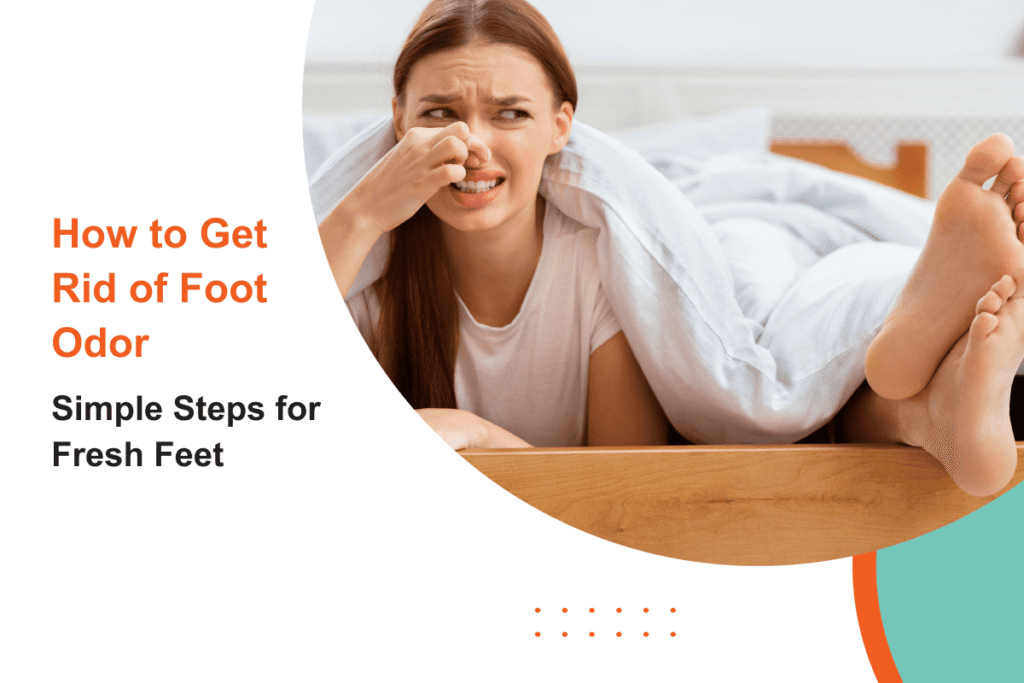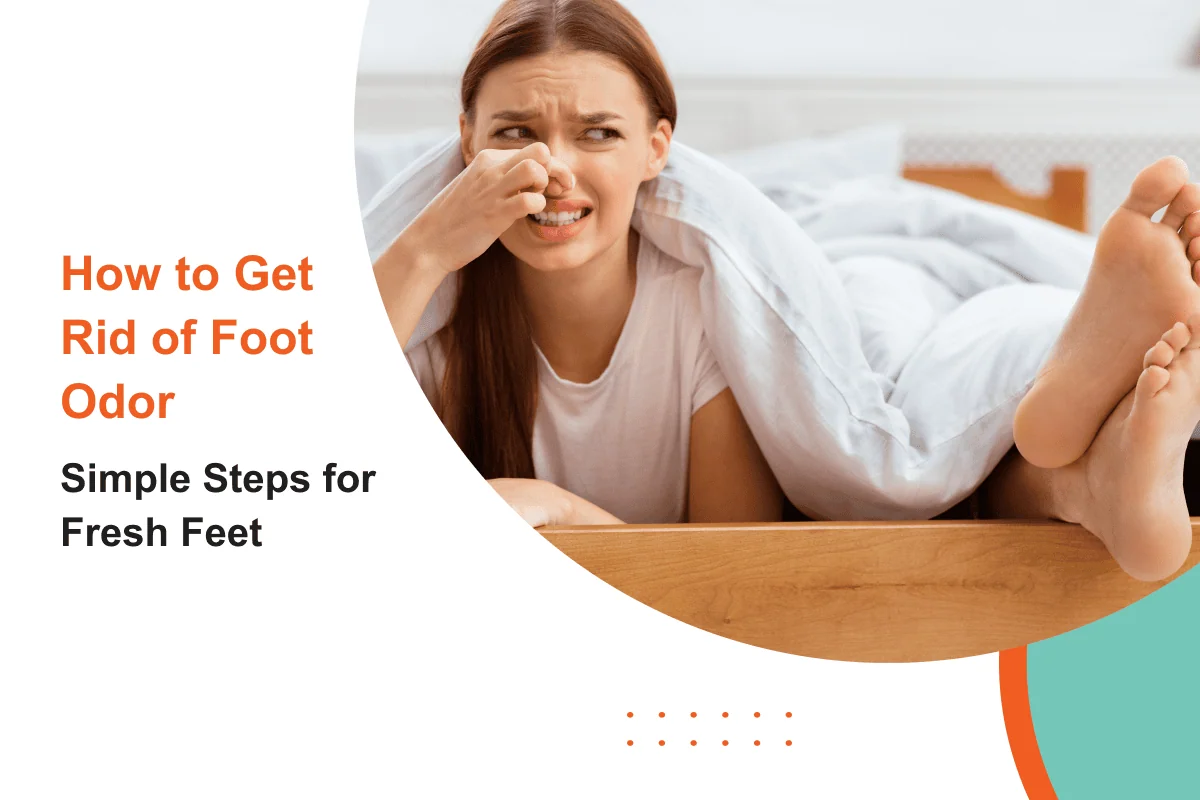
Podiatrists often see patients frustrated by stinky feet. While foot odor is common and usually harmless, it can be embarrassing and disruptive. According to foot specialists, the problem usually results from a combination of foot sweat, bacteria, and occasionally fungal infections. The good news is that consistent care and simple changes can make a big difference. This article outlines what a podiatrist would recommend for patients seeking advice on how to get rid of foot odor, from daily hygiene to professional care.
Why Do Feet Smell?
A podiatrist explains that the soles of the feet contain more sweat glands per square inch than most other parts of the body. While sweating is natural, sweat trapped on the skin allows bacteria to thrive. When mixed with dead skin, the result is the familiar odor associated with smelly feet.
Factors that increase odor include:
- Wearing the same pair of shoes multiple days in a row
- Socks or shoes that retain moisture
- Excess sweating or naturally sweaty feet
- Not taking time to wash your feet daily
- Untreated fungal infections, such as athlete’s foot
Step 1: Wash and Care for Feet Daily
Specialists emphasize the importance of daily hygiene. Patients are advised to:
- Wash your feet thoroughly with soap and warm water every day.
- Dry well between the toes.
- Exfoliate regularly to remove dead skin, which traps bacteria.
This routine is a cornerstone of what podiatrists call “practice good foot hygiene.”
Step 2: Soaking Your Feet
Another method podiatrists recommend is soaking your feet several times per week. Options include:
- Warm water with Epsom salt for cleansing.
- Vinegar soaks to create an environment that bacteria dislike.
- Baking soda soaks to neutralize odor.
These soaks soften skin and help reduce odor, making feet easier to manage.
Step 3: Use Foot Powder and Moisture Control
To combat odor and dampness, podiatrists often suggest medicated sprays or foot powder. These products absorb sweat and prevent bacteria buildup. For patients with excess sweating, powders and antiperspirant sprays may be used twice daily, especially before putting on shoes and socks. Consistent use also lowers the risk of developing fungal infections.
Step 4: Shoe and Sock Management
Foot odor cannot be managed without also addressing footwear. A podiatrist will often advise:
- Rotating at least two pairs of shoes, allowing each pair to air out for at least two days.
- Avoid the habit of wearing the same shoes for days in a row.
- Wearing socks that wick moisture and do not retain moisture.
- Changing socks daily—or more often in hot weather or after exercise.
Proper care of shoes and socks is as important as cleaning the feet themselves.
Step 5: Manage Sweating
Many patients have sweaty feet beyond normal levels. Specialists explain that this can be due to hyperhidrosis, a condition of excess sweating.
Tips include:
- Applying regular antiperspirant to the soles.
- Choosing breathable shoes over plastic or rubber that trap heat.
- Seeking medical care for stronger treatments if sweat is excessive.
In severe cases, treatments may include prescription antiperspirants, electrical therapy, or even injections that reduce the activity of the sweat glands.
Step 6: Treat Fungal Infections Promptly
According to podiatrists, untreated fungal infections make odor control more difficult. Athlete’s foot is a common culprit, leading to redness, itching, peeling, and odor.
- Antifungal creams and sprays should be used as directed.
- Toenails should be kept clean and trimmed.
- Patients should avoid walking barefoot in locker rooms or public showers.
Prompt treatment prevents odor from worsening and protects long-term foot health.
Step 7: Lifestyle Habits That Help
Beyond medical treatments, podiatrists encourage patients to adopt supportive daily habits:
- Wear sandals or open shoes when possible to allow airflow.
- Alternate footwear instead of relying on the same pair of shoes.
- Exfoliate weekly to reduce dead skin buildup.
- Use shoe inserts designed to absorb odor.
Small adjustments go a long way in preventing smelly feet from returning.
Myths Patients Should Avoid
Podiatrists often clarify misconceptions, such as:
- “Only poor hygiene causes odor.” Even clean people can develop an odor if they have sweaty feet.
- “Powder isn’t necessary.” In reality, a quality foot powder can significantly reduce odor and control moisture.
- “Odor will go away on its own.” Without consistent care, odor tends to persist.
When to See a Podiatrist About How to Get Rid of Foot Odor?
Specialists recommend a professional evaluation if:
- Fungal infections keep coming back.
- Odor continues despite daily care.
- There are signs of skin breakdown or infection.
- Excess sweating interferes with quality of life.
A podiatrist can identify underlying causes and recommend tailored treatments.
Conclusion
From a podiatrist’s perspective, learning how to get rid of foot odor requires more than occasional washing. Patients should:
- Wash your feet daily with warm water.
- Use soaks, exfoliation, and foot powder.
- Rotate shoes two days apart and always wear clean shoes and socks.
- Manage sweaty feet and fungal infections promptly.
- Follow consistent hygiene routines.
Visit our foot clinics in Broomfield and Fort Collins, Colorado, where our experienced podiatrists can provide a personal plan to solve your question,”How do I get rid of my Foot Odor?”



